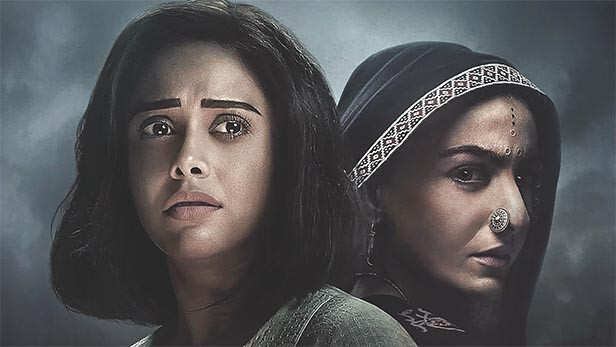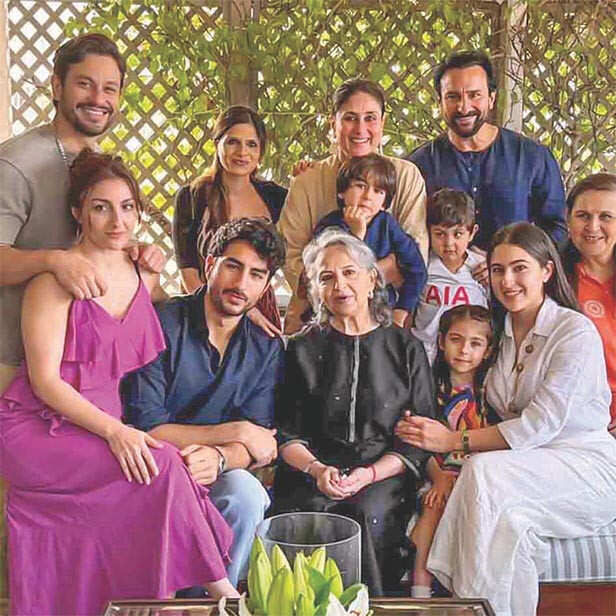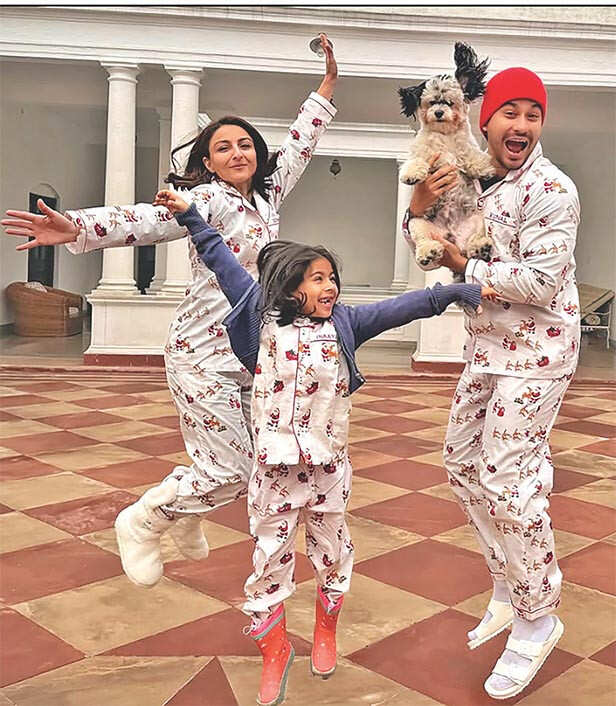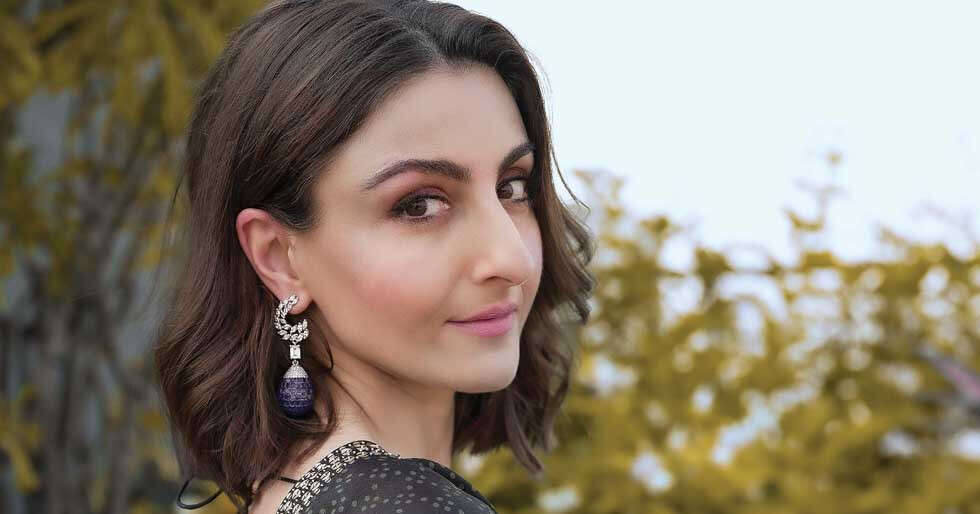She’s royalty but the way she speaks about bringing up her child you identify with her. Being a parent yourself you relate to both her worries and triumphs. She stayed away from film to be one with her daughter and taking a break from careers is a choice most mothers willingly make. But she’s back with a bang with Chhorii 2, a horror film which speaks against both female infanticide and child marriage. Hers is a grey-shaded role and she seems to be a natural fit in it. It’s as if she has never gone away from films. Soha Ali Khan has alway been selective in any case and she understands it’s a privilege. She talks about her comeback and more in a freewheeling interview. Excerpts:
Chhorii 2 has a strong social message wrapped in horror. What drew you to the sequel?
For me, social message is important. But a film, especially a horror film, should be entertaining and should actually scare you. When Vishalji (Furia) narrated it to me, I couldn’t relate to it and I wondered why he wanted to cast me. I thought this is a great opportunity for me too to test myself as an actor and to step out of my comfort zone. So the number one reason was the horror, the atmosphere. The second reason was the social message. The story concerns a seven year old child who is in danger because of some quaint practices which exist. We need to be vigilant about protecting our children.

Was there a scene in Chhorii 2 that genuinely scared you during filming?
My character is grooming a child for a nefarious purpose and the very idea that a woman can do something like that to a young child filled me with revulsion. She too went through something similar as a child and yet she choses to inflict the same horror on someone else. It’s a cycle of violence, abuse and viciousness. Ths was the most disturbing aspect for me.
Do you believe horror is evolving in Indian cinema?
There was a time when B grade horror films were made and people used to say that horror films were not meant for family viewing. And ‘respectable’ actors never wanted to be part of our horror films. I grew up with the idea that good horror films can only come from Hollywood. But there was a film called 100 Days (1991), which I liked when I saw it as a child. Then I saw Bhoot (2003) and I thought that it could also happen in Lokhandwala. Then, Go Goa Gone (2013) gave us a taste of what a proper horror comedy should be like and made us aware that we can also make decent zombie films. Stree (2018) brought horror to the mainstream. It made good use of horror to bring families back to this genre. Now people are watching horror again. Bhool Bhulaiyaa 3 too was a hit. Chhorii 2 has good cinematography, sound design, background score and VFX. I think a well-made horror film stays with you a long time. Sometimes, you get scared in the night just thinking about it. So I feel it’s quite an impactful genre.
It’s been around 21 years since you made your debut. What have you learnt so far in your journey?
I don’t know how much I have learnt. But I have worked on my performance and I’ve become more comfortable in front of the camera. I hope somewhere along the way I’ve become a better actor. Earlier, I used to sign films just on instinct. And it led to some mistakes. Nowadays, I ask Kunal (Kemmu) or bhai (Saif Ali Khan) for their opinion before signing. I know that I’ve the luxury of choice and the privilege of just sitting at home and not doing anything. So, if I don’t like a role I’d rather not do it.

What are some things you would like to change in the business to make it more comfortable for women?
Women should be made more visible. More stories need to be told through a woman’s perspective. But I don’t like this term: women-oriented. Chhorii2 is not a women-oriented film. It has a human subject. It’s two leads happen to be women, that’s all. It’s a female-led film. It’s not a female-oriented film. It carries a storyline which affects us all, irrespective of our gender.
Your mother is a legendary actress, and your father was royalty and a cricket icon. How did their worlds influence your upbringing?
I’m the youngest child of the family. By the time I was born, Abba had retired from cricket, though Amma was working. She used to go for a lot of outdoor shoots. In most households, it’s the wife who’s the homemaker, while the husband goes out to work. But it was just the opposite at our home. My mother was the breadwinner but of course, father was a prince and had a different career trajectory. He was a man apart. And both my parents were quite broadminded. It was never said to us that girls don’t work after marriage or after becoming mothers. If I chose not to work after Inaaya’s birth then that was my personal choice. People ask Amma, “how did your husband allow you to work?” Father never interfered in her work. He never set any sort of restriction on her. She was free to make her own choices. He was a very liberal man and that trait has come in all of his children as well.

Despite your legacy, you’ve always chosen an individualistic, grounded path. Was that intentional?
I don’t think anything has been intentional. It’s just been who I am. Both my parents have not just been achievers, they’ve been super achievers. He captained India for ten years despite losing an eye. She started working at the age of 13 and is facing the camera even today at 80. Her latest Bengali film Pruratawn recently got released. And when you belong to such a family, success and fame are two things you don’t necessarily run after because they aren’t really important. What you have to try and achieve in life is to be happy. Whatever you choose to do, you should do it because you feel the need to do it. And you should find your own identity within that. I’m different from my parents. I’ve different desires, different goals. There shouldn’t be cause for comparison between us.
How has motherhood changed your perspective on work and life?
People close to me have told me that I’ve become obsessed with my child. I don’t trust her with anyone and want to do everything for her, be it feeding her, making her sleep or telling her stories. I had a full-time nanny, mind you. I still became obsessive compulsive about my child. I perhaps even offended people in that space. But it was a journey that needed to be lived. Now in hindsight, I realise I should have done things differently. There’s a lot of responsibility that comes with being a parent because you can see how much you are influencing and shaping another individual, their full value system, their expectations from the world. Their sense of self has a lot to do with what they see in their homes from childhood. How they see their parents interact, how they see their father talk to their mother. That’s where the sense of respecting a woman comes from. How much agency does the mother have, how much security they get all this shapes them as a person. I think the love they get from their parents as children shapes them into the people they become when they grow up. So I wanted to make sure that I protected her and I gave her the best that I could in the early years.
What’s one piece of advice from your mother or brother that has stayed with you throughout your career?
My mother only gave me one piece of advice, which was never, ever marry an actor. So we know how that story ended. She said this because she knew actors wear their hearts on their sleeves. Emotions go up and down with an actor but it’s okay. I’m a calm person and I love a bit of drama. What I’ve learnt from bhai is that while it’s important to value heritage and tradition it’s also important to evolve with time and be modern in your thinking. That’s how he has lived his life and has become the person he is today.
When can we see you acting in Kunal Kemmu’s film?
Earlier, I used to joke that I don’t know how I’ll be able to take direction from him, considering
we’re virtually joined at the hip all the time. But honestly, I’d be honoured if he offers me a film or even thinks of casting me. He’s such a talented writer and director. It might sound like a plug but he has done such a fabulous job directing Madgaon Express. I’m mighty proud of him. But as far as getting a concrete answer about working with him is concerned, well, you have to ask him about it. Put in a good word for me, please, when you do.

What’s the secret to a happy married life?
I feel that you have to keep the romance alive and sometimes we forget to do that, busy as we are
with our careers and children. If you want to keep the flame alive, do things for each other as husband and wife and not as Inaaya ki mummy or Papa. Sometimes, instead of telling Inaaya, “Ask Papa about it,” I tell her, “Ask Kunal about it” and when she objects, I tell her that, “he isn’t my Papa, he’s my Kunal.” It’s important to keep that distinction to keep the relationship romantic.
See Also: Soha Ali Khan, Kunal Kemmu, Ibrahim Khan & Sara Ali Khan at Kareena Kapoor Khan’s Christmas bash!

